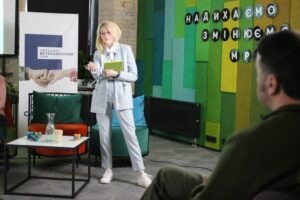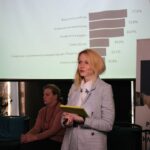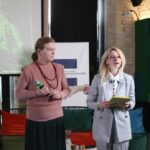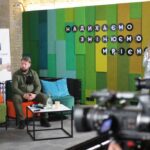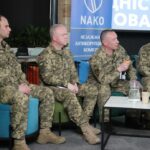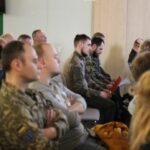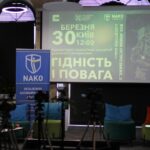The Ukrainian Veteran Foundation of the Ministry of Veterans Affairs Ukraine together with the Independent Anti-Corruption Commission – NAKO presented the strategic concept of interaction with veterans “Dignity and Respect“.
The goal is to create veteran non-discrimination policies towards veterans and their family members to avoid discrimination against former military service compared to other citizens when receiving government or commercial services.
The first large-scale discussion was held on March 30, 2023, with the participation of representatives of the Ukrainian Veterans Foundation, the Ministry of Veterans Affairs, the Ministry of Internal Affairs, the Ministry of Defense, the General Staff, deputies of the Verkhovna Rada of Ukraine, NAKO and representatives of the public.
What was discussed at the event and its conclusions are below:
Introductory words
Svitlana Musiyaka is the head of research and policymaking at NAKO:
“It is obvious that Ukraine has now become a country of veterans. After 9 years of war and a new stage of full-scale invasion, many of our fellow citizens took up arms and went to defend us from the invasion.
The question about those who continue to support the state in peaceful conditions: will we be able to meet them with dignity, will we be able to provide proper conditions for those veterans who will return to civilian life? At today’s event, we will discuss these and other related issues.
We will also be happy to present to you the preliminary results of the research conducted by the sociological group “Rating”. We will also present the preliminary results of the legal support line, which was launched by NAKO together with the Ukrainian Veterans Foundation. And we will be glad to listen to our honored guests representing various state institutions and organizations about how we should build our joint work.
Yulia Laputina – Head of the Ministry of Veterans Affairs of Ukraine:
“I want to thank the Ukrainian Veterans Forum, which is a structure of the Ministry of Veterans’ Affairs. We launched it last year, and it already leads many proactive projects in the direction of supporting veterans. I would also like to thank our NAKO partners, thanks to whom we are here with you now, who are also very proactive. And I will start by saying that this topic, which we are talking about today, has been relevant for many years, and it has been relevant since the beginning of Russia’s war against Ukraine, since 2014.
And now we are facing new challenges, because after our victory, a much larger number of people than since 2014 will return to their families, communities and work. Now the state will moderate their protection, support, opportunity for self-realization, integration in all spheres of life and full life after what they saw at the front, our future depends on it.
Veterans policy is a separate type of policy. This is not purely a social policy of some kind of payments or guarantees, it is a security policy, an economic policy, a cultural policy and, of course, a social policy. Because the main quality of a veteran is his willingness to defend his country, his sacrifice. If we are talking about a personnel army, then a military man, signing an oath, actually signs his readiness for a delayed death. It may seem pretty brutal, but any military person understands it. And this requires an appropriate honor and respect after they finish their service.
When a person serves, he is a defender of Ukraine. When he returns to a peaceful life, he must turn into a warrior of restoration.
The state should provide a person with tools for development, obtaining a civilian profession, and then provide the opportunity to work. In addition, there are many psychological challenges, because the veteran will return not only to the community, he will return to the family, which may have become different during this period, received a different experience, and the veteran himself or the veteran also received a different experience.
People should learn to perceive their relatives who have returned from the war as different.
In order to be sustainable as a state, sustainable as a community, sustainable as Ukrainian society, we must support the readiness and ability of veterans in case of escalation, the threat of returning to the ranks of the Armed Forces or other units.
I can say that according to the statistics of our registry, at the time of the large-scale invasion, we had about half a million of our categories of people. These include veterans, veterans, family members, fallen heroes, persons with disabilities as a result of the war. 80% went to the front again, and the remaining 20% are either persons with disabilities or family members of the victims. That is, almost all of ours, and we are proud of this number, because Ukrainians are consciously going to defend the country, and those who had combat experience are back in the ranks.
In Ukraine, during the 30 years of independence, no one analyzed where military personnel go after their service, no one analyzed where the potential and experience of such a person can be used in the best possible way for the country’s economy and for the person himself.
An American soldier is normally asked by the HR manager how many hours he spends with his family. This is not about someone wanting to interfere in personal life, but about the fact that a person who serves in the army should have a full life.
The Ministry of Veterans Affairs of Ukraine should be one clear point of entry for all veterans. It should coordinate work with veterans. It is it that should communicate with veterans, and so that there is no such situation when a veteran returns, and he expects to be respected, but in reality he has to chase various authorities to get his services.
Problematic questions and their discussion
The discussion was attended by:
Yulia Laputina — Minister of Veterans Affairs of Ukraine
Colonel Mark Andrusiak – deputy chief of the Main Personnel Department of the General Staff
Colonel Yuriy Vitaliyovych Podolyan – deputy commander of the Medical Forces of the Armed Forces of Ukraine
Colonel Volodymyr Yacentyuk – deputy chief of the Main Department of the Military Medical Center of the Armed Forces of Ukraine
Ruslan Prykhodko – general director of the Directorate of Social Protection of the Ministry of Veterans Affairs of Ukraine
Mykhailo Bondar is a People’s Deputy.
Moderator – Ruslana Velychko-Trifonyuk – first deputy executive director of the Ukrainian Veterans Foundation:
– We have a problem with obtaining the status of the Participant in hostilities (UBD) and obtaining the documents necessary for the registration of the UBD. Do you think that this problem affects the mobilization and, in general, the defense capabilities of the country? After all, this is also discrimination.
Colonel Mark Andrusiak — Deputy Chief of the Main Personnel Department of the General Staff:
– I personally believe that the timely receipt of the UBD status affects exclusively the receipt of personal social benefits for military personnel. Perhaps, indeed, it is possible to connect it in some way to the mobilization, perhaps the spread of rumors about the timely acquisition of status will in some indirect way affect these measures. But still, this applies more to military personnel personally.
By and large, obtaining the status of a participant in hostilities for servicemen who are currently participating directly in repelling armed aggression began in December and is gaining momentum, and is carried out practically in a geometric progression. Therefore, I think that this problem will most likely be solved in the near future.
R.V.: And you deal with solutions and modernization?
M.A.: Currently, we work directly in accordance with the law of Ukraine on the status of war veterans, in accordance with Cabinet of Ministers Resolution No. 413, which directly determines the procedure for granting the status. According to our internal documents, the issues are settled. We see certain problems, and there are certain developments in order to speed up these processes. I think that the General Staff, together with the Ministry of Defense, will come up with proposals in the future to improve these issues.
After all, you understand that the procedure is as follows: if you wrote a report, and it was not accepted, then you should contact your superior. And if you are at the frontline?
Yulia Laputina — Minister of Veterans Affairs of Ukraine
– If possible, I will clarify. Now, the issue of military medical commissions (VLK) and obtaining statuses is under the control of the Prime Minister of Ukraine. We have recently held a number of meetings with the participation of all relevant ministries and structures. What is the biggest problem now? In order to start the process of acquiring the status of such a person, a certificate from the military unit about the circumstances of the injury is mandatory. And the military units are fighting now, they do not always provide these certificates. From this, the process of registration of other documents begins, and without this certificate, other structures cannot start the registration process.
Y.V.: As soon as possible.
R.V.: As soon as possible?
Yu.V.: I am not ready to give you the exact numbers.
R.V.: Well, I just read it a couple of times.
Y.V.: I also read it several times, but I did not intend to prepare for such questions. Then the documents are sent to the Commander-in-Chief for approval, he gives permission to cross the border. And what exactly is the delay? The delay appears in the fact that the Ministry of Health enters these documents into the database.
And only medical institutions of foreign countries select a patient whom they can take for treatment. It cannot be any hospital selected independently, because doctors select exactly those patients to whom they can provide adequate medical care according to their profile. And the delay occurs precisely when a patient can be in the database for a month or even several months, or he is simply not selected by foreign medical institutions. After confirmation by a foreign medical institution of the possibility of providing such assistance, the Ministry of Health informs us within two days, and we immediately prepare a package of documents, and this patient goes abroad.
R.V.: Is it possible to develop, for example, some other function, because just a week ago we were contacted by individuals, the defender had already lost one eye, the second was almost lost, they agreed with a clinic in Israel, because his mother lives in Israel. That is, the family has money, they can take him out, they can treat him with their own money. Perhaps it is worth somehow thinking out another function so that the serviceman can be sent if the clinic guarantees, for example: sends a letter, we guarantee that it is paid for here, so that he is released.
Y.V.: This function works when servicemen or members of their families apply that they have chosen such a medical institution and provide a guarantee letter from this particular institution, we also send this guarantee letter to the Ministry of Health and such a patient can immediately be discharged abroad.
Colonel Volodymyr Yacentyuk — Deputy Chief of the Main Department of the Military Medical Center of the Armed Forces of Ukraine:
– The system is fixed. Today, as far as I know, about 600 wounded people who need help abroad are in the database of the Ministry of Health. To date, 250 have left for treatment, and the remaining 300 are waiting for foreign clinics to choose them.
And, for example, even the fact that parents have chosen a clinic is not a 100% guarantee, the Ministry of Health ultimately looks at whether this clinic really corresponds to that treatment.
The command of the Medical Forces is doing everything possible to send them as soon as possible. We have no problem sending the we have a problem to be accepted there and really provide qualified assistance for the defenders.
A month ago, thanks to the decision of the Commander-in-Chief, a system of social support was introduced in the Armed Forces of Ukraine. We fought over this project for 3 years, and we are very grateful that the leadership supported us, and we are working in this direction.
Today, the main tasks are, of course, the social adaptation of a serviceman before his retirement provision, as well as assistance in the implementation of the rights and guarantees provided for him. That is why, for example, we help in establishing the status of a military serviceman: a participant in hostilities, a person with a disability as a result of hostilities, a war veteran. In addition, full information of a military employee is provided regarding the payments due to him, both during hostilities and in the event of his retirement. This is also important for us.
And, of course, today, before the discharge of a serviceman, we provide an algorithm of actions, how he can come and really socialize into civilian life, where he can go, what kind of help awaits him at the threshold of the Armed Forces of Ukraine.
By the Act of the Commander-in-Chief of the Armed Forces of Ukraine, General Valery Zaluzhnyi, in October 2022, all recruitment and social support centers were tasked with establishing close cooperation with the structural units of the Ministry of Defense on the ground and handing over this serviceman who is being released.
That is, we are currently working on developing a database, digitalization of this process.
There are psychologists at hospitals in the Command of the Medical Forces. They are in rehabilitation departments. But the main part of psychologists serve in the Armed Forces.
R.V.: We all hear, and I also know that such an issue was even discussed at the government, that there is a certain problem with the provision of medical assistance to defenders abroad. Having clearly analyzed the normative legal act, absolutely all relevant bodies have defined terms, and only the Medical Forces of the Armed Forces of Ukraine do not have these terms. How did it happen? Is this possibly a bug? Is there some logical reason that civilians can’t understand?
Y.V.: Please clarify the question about which terms you mean.
R.V.: For example, the Ministry of Health must provide an answer on hospitals, on hospitals within a certain period, etc. And only in the Medical Forces there are no defined terms. You just collect documents, submit documents and so on. Perhaps it is still worth re-reading this regulatory act, establishing clear deadlines and perhaps even developing such a business process in order to improve this procedure, because a lot of people turn to us for legal advice with the question: “what we have to do in order to take the wounded abroad, but he is still a serviceman.” That is, “we have money, we have a clinic that will accept us, but we still need to collect a package of documents in order to take him out…”. I’m trying to understand, and maybe everyone can understand, what the problem is.
Y.V.: In fact, such a problem does not exist, because in the Medical Forces these documents are processed in the shortest possible time, and in order to understand the entire procedure, you need to familiarize yourself with Resolution No. 411.
If a serviceman is undergoing treatment, a consilium is convened to determine the need for his treatment abroad. For this, doctors gather, they prescribe the need, and the documents are directed to us, to the Command of the Medical Forces. And the Command immediately forms a package of documents, sends it to the Ministry of Health.
R.V.: That’s what it says in this legal act : is it right away or within one or two weeks?
The problem actually exists, because people, especially those who are seriously injured, should get status as soon as possible so that they become recipients of appropriate social guarantees, including medical services. Therefore, the main point now is also focused on digitization, in order to, let’s say, speed up the process, firstly, and remove unnecessary links – secondly. But we also understand that there must be a certificate of injury, because a person who is injured, and if he, God forbid, dies, then this is an appropriate official investigation, which is very often delayed by the prosecutor’s office, and because of this, we can further start conducting procedures for acquiring statuses. Now it is said that the medical commission should be summoned to the medical institution where the person is being treated. And the prime minister personally said yes, I want us to start from the bed where the person is lying – she was given the whole package of documents with the statuses, and she went home, to continue her treatment, and so on. That is, now, I think, it will be resolved in the near future. Indeed, the bureaucratic system of the Ministry of Defense, VLK, MSEK is very complex. But all this is at the highest level of control – the state leadership.
Treatment
R.V.: Our crisis support hotline is often contacted by servicemen who are currently in hospitals, and very often they tell us rather strange stories. I would like to know what measures are taken by the Command of Medical Forces to help people who end up with certain traumatic physical and psychological conditions. How many psychologists do we have in hospitals now? For example, a friend of mine suffered a psychological injury, he was brought to the hospital, and the only way to protect him was that the medical staff took the handles from the door and carried them in their pockets. How to treat this? It’s about discrimination, actually, too.
Colonel Yuriy Vitaliyovych Podolyan — Deputy Commander of the Medical Forces of the Armed Forces of Ukraine:
– The issue is complex and requires a systemic solution, and the Command of the Medical Forces is constantly working to improve the provision of such care. Everyone knows very well that under the leadership of the First Lady, psychological care is being developed in our country. The Command of the Medical Forces has repeatedly dispatched servicemen to gain experience and training in partner countries, including Israel. After returning, they spread this information and knowledge specifically among psychologists, and we are increasing such opportunities. But, of course, such a problem exists.
We have developed a three-stage system of providing psychological assistance from the battlefield to treatment.
But mainly 80-90% we return to the formation after mental injuries received on the battlefield. Treatment lasts from several hours to several weeks or months. We were very interested in the research that you presented today regarding discrimination in the Armed Forces of Ukraine. Therefore, we hope that together with the Ministry of Veterans, we will respond to all this.
R.V.: You often note that persons who want to obtain the relevant statuses provide the wrong package of documents. And that’s why they get rejected. To what extent do state institutions cooperate in order to avoid these errors in documents?
Director General of the Directorate of Social Protection of the Ministry of Veterans Affairs of Ukraine Ruslan Prykhodko:
– If you remember, in 2022, together with the Verkhovna Rada, we provided modifications to the law and added the right to categories of persons who took part in hostilities during the Russian Federation’s full-scale armed aggression against Ukraine. And accordingly, new armed formations were added, which appeared in accordance with the Law of Ukraine “On the Basics of National Resistance”. These are the forces of territorial defense and voluntary formations of territorial communities.
Since the beginning of the full-scale invasion, we have had a lot of new units formed. Accordingly, new commissions were created to consider certain materials.
Currently, colleagues have worked out a clear step-by-step algorithm for commanders of military units, their step-by-step actions for the correct registration and forwarding of documents to the commission.
Moreover, there are methodological clarifications on how to correctly draw up certain documents. And currently, it is very difficult for the people who participated in repelling the armed aggression of the Russian Federation during this period to document all this again. Moreover, a very large number of Ukrainian citizens volunteered to defend their homeland.
Therefore, in order to regulate this issue normatively, we, together with the Committee of the Verkhovna Rada, worked out a corresponding bill, which was adopted by the Verkhovna Rada and signed by the President. Currently, all draft resolutions have been prepared and jointly agreed on all volunteers and all statuses of a participant in hostilities, a person with a disability as a result of the war, and a family member of a fallen defender of Ukraine. Some of these resolutions have already been approved by the central bodies of the executive power, others are currently being approved and will be sent to the government for consideration in the near future.
Accordingly, after that, an additional interdepartmental commission will be created on the basis of the Ministry of Veterans Affairs, which will consider these materials very quickly.
Our main task – together with state authorities, with our colleagues from the Ministry of Defense, from the General Staff of the Armed Forces, as a whole of the entire security bloc – is to create such a synergy that minimizes the participation of the direct beneficiaries, i.e. servicemen or families of those who were injured, those who were commissioned, etc. in these bureaucratic processes. For this, this issue is raised at the highest level in our country, and the President of Ukraine raises it, and the Prime Minister, at all levels, where possible, that is why such work is being conducted.
Veteran business
R.V.: I would like you to pay attention to the draft law, which has been in the specialized committee for more than a year and is not moving anywhere. This is a draft law on veteran business. And for some reason, everyone says, what we have to do with the veteran’s business and what for, but at the same time we still have valid laws on milking cows, on agricultural cooperation. Yes, they are valid. But there is no place for a veteran business… The veteran business relocated and continues to work, develop and provide people with jobs. That is why it is very important. However, I do not know the answer to why this draft law has been lying around for so long and the time is still not right for it.
Mykhailo Bondar is a member of the Verkhovna Rada:
– Look, for my part, I can tell you that, unfortunately, the Verkhovna Rada is not as monolithic as the state is now in the fight against the enemy. With the majority of “servants of the people”, unfortunately, draft laws of other political forces, which, for example, do not so much share the desire to adopt this or that law, are not all the time, as they say, considered in committees, because, having a monomajority, they respectively, have a majority in each committee. Therefore, there is a struggle here all the time and, as they say, not all the time in favor of the opposition.
R.V.: But there are regulations. You, as a people’s deputy, can turn to the specialized committee and write that this draft law was submitted a long time ago…
MB: Believe me, all this is being done, and you would have seen it all if the Verkhovna Rada meetings were allowed to be broadcast. You would have seen it all! Unfortunately, the society is not given the opportunity to see the discussion of those draft laws, they are not given the opportunity to see, for example, the conciliation council, where political forces demand to put this or that draft law in the session hall to pass it, because it is on time. And you would clearly see who is blocking the rejection of these laws. Well, I hope that from the first day, after the adoption of the law “On Media”, all this will happen – the society will already more realistically see how the law is adopted. But you hear, among other things, about legislative initiatives from some of my colleagues to deprive, for example, participants in hostilities from their benefits, or even not to deprive them, but to limit them for two or three years, have you heard of this?
R.V.: Let’s not use the word “benefits” before the word “combatants”. I’m sorry, but these are not benefits, this is our gratitude, this is our debt, which we as civil citizens, and the fact that they gave their lives, their health, and they have very big health problems. These are not benefits, this is our debt to them. Let’s not talk.
M.B.: Well, I myself am a participant in hostilities, that’s why I say it the way we say it between brothers and sisters in arms, that’s why, I say, it’s like that, in a simple way.
I don’t want to offend my brothers and sisters in any way, but that’s how it looks. You see, including the initiatives that are being discussed to limit, for example, the nomination of members of the combatants there, to the deputies of various levels, to the positions of officials. Sitting here is my colleague and brother in arms Bohdan Matkivskyi, People’s Deputy of the eighth convocation, member of the battalion named after General Kulchytskyi. We are trying to make the voice of veterans heard both in the Cabinet of Ministers and at all levels. And with all due respect to all wishes for society to perceive a participant in hostilities, a veteran properly. As long as the Minister of Veterans is not treated in the same way in the Cabinet of Ministers, there will be no other option in society. If funds will be allocated to this ministry according to the principle of the balance, and they listen, there will be no other option.
Because if we are talking about the negative attitude of our fighters to the provision of medical care, we have the Ministry of Health, it should hear it and do everything possible.
If we talk about work, what the fighters experience when they return from the front line and there is no employment, then there is the Ministry of Economy that should deal with it. Therefore, as long as the Cabinet does not respect the Ministry of Veterans, society will not do so.
R.V.: I will interrupt you, I will ask you to turn it on, there is an infographic, that’s what it’s called, an infographic. Please show me.
The profile law was adopted in 1993. Sometimes it seems to me that it should be read honestly, on some comedy shows and the like. Because there are, for example, such things that when the deceased’s wife remarries, it means that she already loses the status of a member of the deceased’s family. That is, the state says for the woman, they say, come on, you mourn for the rest of your life, put on a black scarf, walk here and there every day and die there next to the grave. Well, this is not normal in the 21st century.
And now the executive authorities implementing state policy in the sphere of providing social benefits and other state guarantees.
You, as deputies, as civil servants, as a command, as a military man, can you somehow deal with this?
R.V.: I know that a new law is currently being worked on, and I think that all this would not happen, and that it would be somewhere like in Great Britain. Because in this country, even at the legislative level, there is an agreement between civilians, business and the state on non-discrimination of military veterans and their family members. And it is there that the department of veterans coordinates, controls, and allocates the entire budget, and develops it where it is most needed.
And with us, it turns out. There is the Ministry of Veterans Affairs, then we look at all this, we read the regulations about the Ministry of Veterans Affairs, and they are absolutely limited in some of their capabilities and what they can do. This new bill will solve this issue at least a little, and I will surely ask a question that interests everyone. When?
Director General of the Directorate of Social Protection of the Ministry of Veterans Affairs of Ukraine, Ruslan Prykhodko
– Now the work is in progress. Some ministries, unfortunately, for various reasons are not very actively involved in this process, but we are working on it. Many draft laws are passed much faster if they are submitted by a people’s deputy or a group of people’s deputies. This is how we accept the majority.
“How to eliminate problems with registration of UBD status: clear suggestions”
Analysis of the operation of the UVF legal support line, where 80% of appeals relate to illegal/unmotivated refusal to provide documents necessary for registration of the status of a participant in hostilities without providing any explanation.
“Procedure of actions for obtaining UBD. Step-by-step explanation from a lawyer of the UVF”
Presentation of the business process model, which will allow to eliminate the main delays and problems in the process of obtaining the documents necessary for registration of the status of a participant in hostilities.
Also during the event, the preliminary results of the sociological research of the “Rating” group, conducted on the demand of NAKO and the UVF, were presented on the issues of restrictions on the rights or privileges of veterans, their family members, family members of the fallen (deceased) defenders based on gender, nationality, appearance, position in society, etc.
